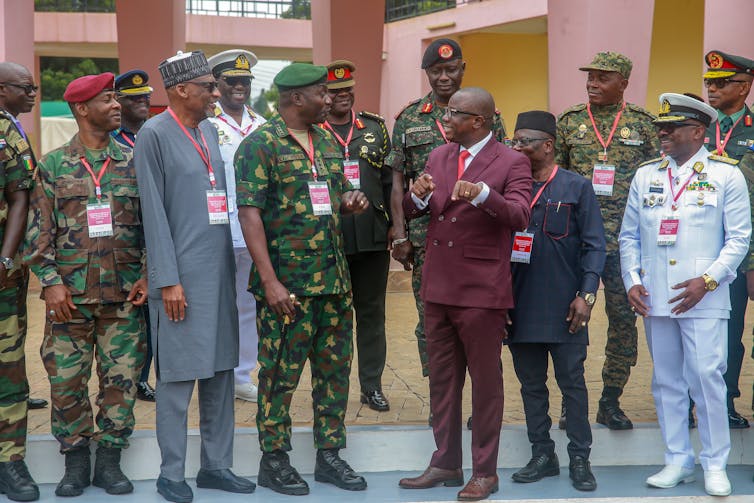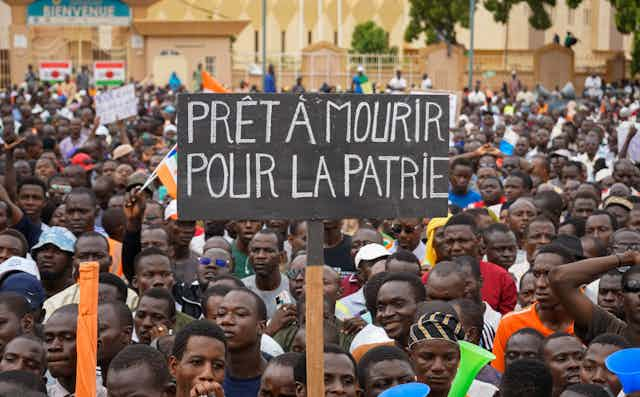A month after the coup in Niger that toppled the democratically elected civilian government of Mohamed Bazoum, the country’s neighbours are still debating the possibility of military intervention.
The Economic Community of West African States (Ecowas) – a coalition of west African countries, which includes Niger – has said it intends to send in a taskforce to topple the military junta led by General Abdourahamane Tchiani, which ousted Bazoum on July 26.
But the plan to intervene is not without controversy. Niger, a landlocked nation, shares borders with Mali, Algeria, Libya, Chad, Benin and Burkina Faso. These countries have expressed solidarity with the military junta and have committed to oppose any potential Ecowas intervention.
France, which occupied Niger from 1890 until independence in 1960, has also considered intervention – it has a small contingent of troops in the country ostensibly to combat jihadi insurgency in the Sahel region – which the junta has given them notice to withdraw. Algeria has also denied France permission to fly over the country.
For now, the situation remains fluid and uncertain. But beneath the surface of daily news headlines is an intricate web of geopolitical competition and strategic agendas that have profound consequences for the Nigerien people.
The recent coup underscores a geopolitical rivalry deeply rooted in colonial and neo-colonial legacies and intensified by some western nations’ drive for the control of Niger’s resources.
Although Niger grapples with extreme poverty, leading to widespread malnutrition and hunger among its citizens, it is the world’s seventh-biggest producer of uranium. This juxtaposition of mineral wealth and societal poverty underscores the irony of a nation abundant in resources yet plagued by profound economic hardships.
First discovered in 1957 at Azelik by a French colonial expedition looking for copper deposits, Uranium now ranks as Niger’s second-largest export in monetary value – surpassed only by gold. The country is a principal supplier of uranium to the European Union (EU) and contributes between 15% and 17% of the uranium fuelling France’s electricity generation.
Meanwhile, the country struggles to produce its own electricity because Nigeria recently terminated its power supply to the nation as a sanction against the military junta, leaving much of the country in darkness.
Western exploitation
Given its abundant natural resources, it seems counterintuitive for Niger to rank among the world’s poorest nations. Yet its economic and political struggles have deep roots in historical foreign interventions, exploitation and resource extraction. This situation has, for decades, been further compounded by misguided and ineffective leadership, often conniving in exploitation by foreign interests.

While some Ecowas members oppose the coup in Niger and have threatened military intervention against the coup leaders, some western countries are manoeuvring to uphold their interests. The Nigerian senate opposes military intervention, with one of its members alleging that Ecowas would merely be doing France and America’s bidding. Senator Orji Uzor Kalu suggested that if there is to be military action, it should be carried out by French and US troops.
Colonial powers and other major geopolitical actors have profoundly influenced Niger’s contemporary situation. France, referred to by the New York Times recently as the “Former Coloniser that Stayed”, has already warned that any attack on its interests in Niger will be met with retaliation. Meanwhile the reported presence of Wagner Group mercenaries in the country, after a request from the coup leaders, is a proxy for Russian interests in Niger.
But following the reported death of Wagner Group boss, Yevgeny Progozhin, after his private jet is understood to have crashed on a trip from St Petersburg to Moscow on August 23, the status of the Wagner Group activities in Niger – and Africa generally – is uncertain. However, their operations may come under the direct control of Russia’s military.
African resources, western interests
Another important resource issue threatened by instability in Niger is the trans-Saharan gas pipeline (TSGP), designed to transport natural gas from Nigeria through Niger and on to Algeria and then to Europe. One of the drivers of this project in the past two years has been the European need to wean itself off Russian gas supplies in light of the war in Ukraine.
Yet again, western resource needs are dictating events in supposedly independent and sovereign African countries.
The dominant narrative in west Africa frequently presents foreign interventions as benevolent efforts to stabilise the Sahel region, in particular, against the threat of jihadi insurgency. Yet a deeper examination uncovers a more intricate reality. As western powers strive to shape political dynamics in Niger – driven not just by a desire for stability but also to preserve their dominance and control over resource allocation – they portray Niger, and by extension, Africa, as mere markets within the global economy. This ignores the potential humanitarian consequences of such interventions for the people of Niger and west Africa in general.
As Niger faces political instability and possible violent conflict, there’s a pressing need to critically evaluate the motives and repercussions of foreign intervention.
Beyond the veneer of the quest for democracy and stability, the various players’ deeper strategic intentions must be scrutinised. This is the key to understanding the multifaceted dynamics in the Sahel region and their broader global implications.

